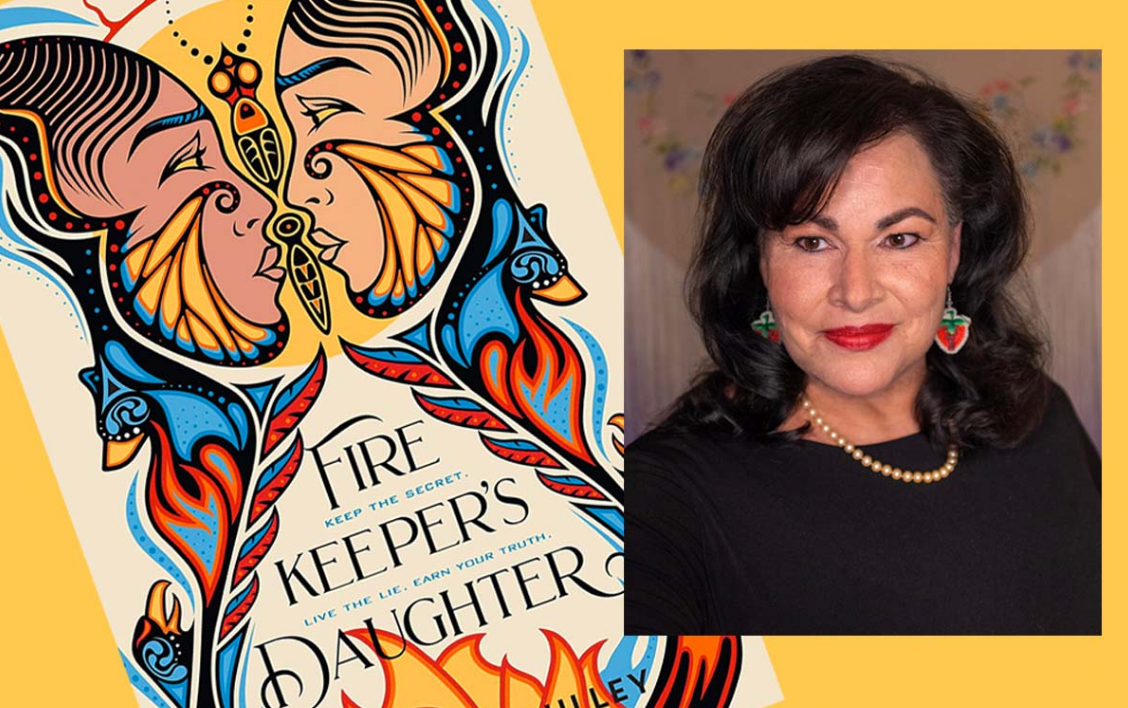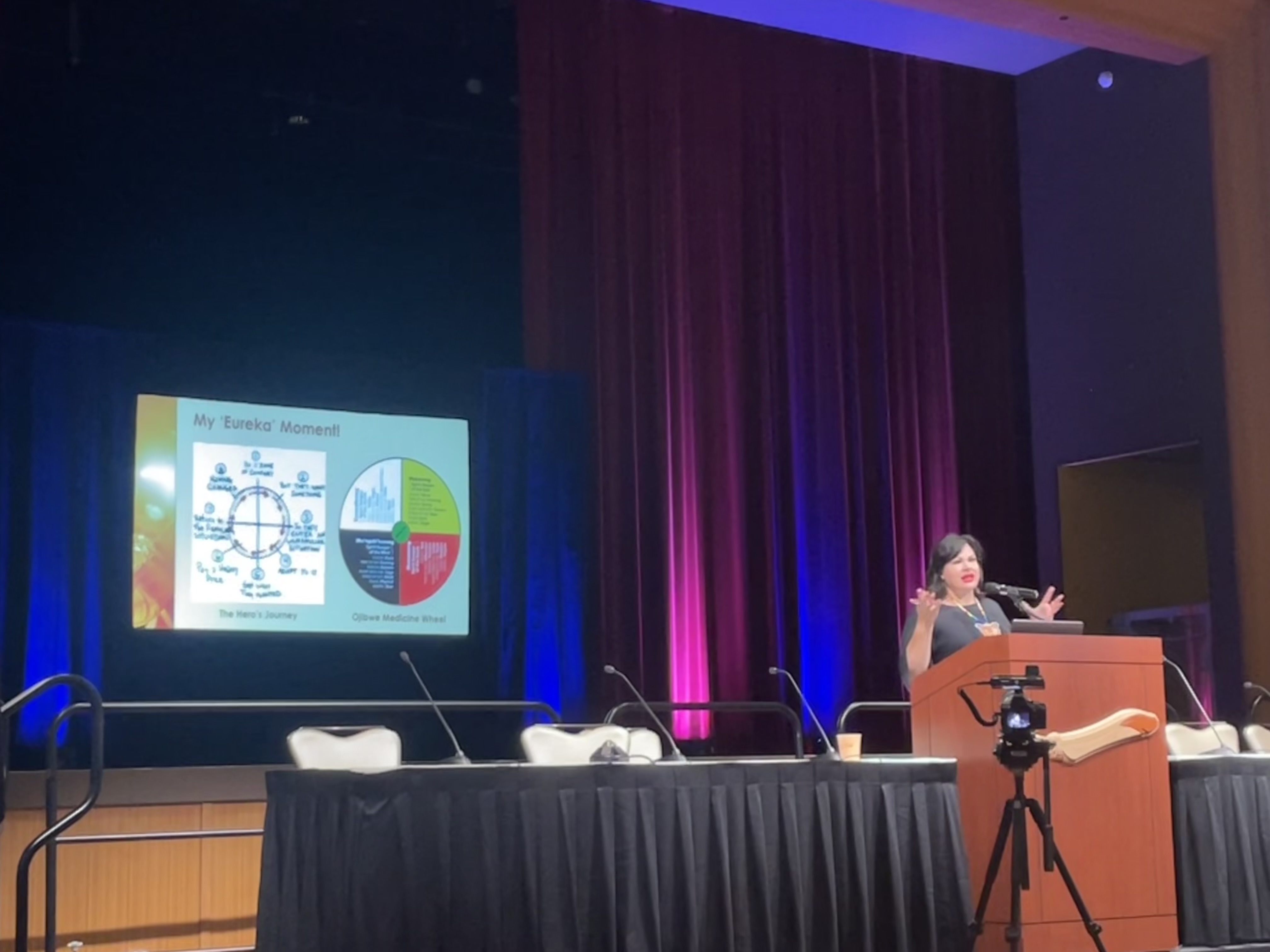
- Details
- By Jenna Kunze
She thought: “Who is this person?” and ran into the nearest business — a cheese shop — to put the girl down on paper. That voice, belonging to a character Boulley later named Perry Firekeeper-Birch, would end up as the newest heroine in her forthcoming novel: Warrior Girl Unearthed, slated for publication on May 2, 2023.
“I wrote this stream of consciousness of this 16-year-old girl, sitting in a police station, waiting for her parents to come and get her,” Boulley told audience members on Oct. 13 as she delivered a keynote address on the importance of Native representation in literature at the Association on American Indian Affairs’ 8th annual repatriation conference in New Buffalo, Michigan. “I realized that my story for book two was going to be an Indigenous Lara Croft, where, instead of raiding tombs, she’s raiding museums to bring our ancestors home.”
Less than one percent of all books published in the U.S. feature a Native American main character, according to data from the Cooperative Children’s Book Center at the University of Wisconsin-Madison. In 2002, When the university first began collecting diversity data, just six of 64 books on Indigenous people were authored by an Indigenous person. Twenty years later, that number rose to 60 out of 74 books.
“I was one of those 60 authors,” Boulley said.
Boulley’s debut novel, Firekeeper’s Daughter, published in March 2021, is loosely based on Boulley’s Ojibwe community in Michigan’s Upper Peninsula and features themes of bi-racial identity, grief, loss, and justice – “who gets it, and who doesn’t.” Notably, Firekeeper’s Daughter is written partially in Ojibwe. Boulley said she pushed back against including a glossary in the book, so as to center the Indigenous reader.
 Angeline Boulley delivered a keynote address at the Association on American Indian Affairs’ 8th annual repatriation conference in New Buffalo, Michigan on Oct. 13. (photo by Jenna Kunze)
Angeline Boulley delivered a keynote address at the Association on American Indian Affairs’ 8th annual repatriation conference in New Buffalo, Michigan on Oct. 13. (photo by Jenna Kunze)
“Representation in children’s literature, it matters,” Boulley said. “It means choosing Indigenous stories authored by those more likely to know community nuances and when to draw the curtains to protect Indigenous knowledge. Telling a truthful story about my community meant sharing about the joy, connectedness, healing, and humor as much as revealing unpleasant truths faced by a teen coming of age in a tribal community.”
Firekeeper’s Daughter landed Boulley a seven-figure book deal, made the New York Times best-seller list within a month of its publication, stayed there for 20 weeks, and led to numerous awards. It also led to a forthcoming Netflix series, for which Boulley sold the film rights to Higher Ground Productions, owned by Barak and Michelle Obama.
Book reception is essential, Boulley notes, because it sets the stage for future Indigenous authors.
“Mainstream publishing is overwhelmingly white and male,” Boulleysaid. “And there are mediocre people who get at bat multiple times. But if you’re from a marginalized community … you get one time at bat. And if you don’t get on base, it’s going to be a very long time before someone else from your community gets a deal like that.”
In addition to the awards and the significant financial boon from Firekeeper’s Daughter, Boulley said feedback from the public — teachers telling her that a reluctant reader finished her book before anyone else in the class or a non-Native person telling her how much the story resonated with them — let’s her know she’s helped the next Indigenous author up to bat.
“I’m excited for Warrior Girl Unearthed to tell a story about ownership of indigenous bodies past and present,” Boulley said. She added that, while writing the book, she consulted with Indigenous subject-matter experts on NAGPRA. Museums and institutions throughout the country still hold at least 108,000 Indigenous ancestor’s human remains in their collections.
“What I want is to have teens take up this very important charge of studying anthropology, archaeology, historic preservation and be those warriors that we need going forward until every ancestor is brought home.”
More Stories Like This
Watermark Art Center to Host “Minwaajimowinan — Good Stories” ExhibitionMuseums Alaska Awards More Than $200,000 to 12 Cultural Organizations Statewide
Zuni Youth Enrichment Project Takes Top Emerging Artist Apprentices to Phoenix for Artistic Exploration and Cultural Immersion
From Dishwasher to Award-Winning Chef: Laguna Pueblo's Josh Aragon Serves Up Albuquerque's Best Green Chile Stew
Rob Reiner's Final Work as Producer Appears to Address MMIP Crisis
Help us defend tribal sovereignty.
At Native News Online, our mission is rooted in telling the stories that strengthen sovereignty and uplift Indigenous voices — not just at year’s end, but every single day.
Because of your generosity last year, we were able to keep our reporters on the ground in tribal communities, at national gatherings and in the halls of Congress — covering the issues that matter most to Indian Country: sovereignty, culture, education, health and economic opportunity.
That support sustained us through a tough year in 2025. Now, as we look to the year ahead, we need your help right now to ensure warrior journalism remains strong — reporting that defends tribal sovereignty, amplifies Native truth, and holds power accountable.
 The stakes couldn't be higher. Your support keeps Native voices heard, Native stories told and Native sovereignty defended.
The stakes couldn't be higher. Your support keeps Native voices heard, Native stories told and Native sovereignty defended.
Stand with Warrior Journalism today.
Levi Rickert (Potawatomi), Editor & Publisher


